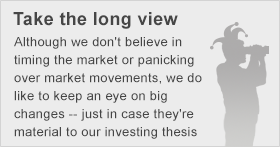
Let's take a look at four stocks -- Bayer (BAYRY 0.10%), Merck (MRK +1.34%), Medivation (MDVN +0.00%), and AstraZeneca (AZN +0.34%) -- which could all make waves across the health care sector this Tuesday morning.
Bayer acquires Merck's consumer care business for $14.2 billion
Merck just announced that it was selling its consumer care business to German pharmaceutical giant Bayer for $14.2 billion. Last year, Merck's consumer care business generated $1.89 billion in revenue in 2013 (a 3% year-over-year decline), accounting for 4% for the company's top line.
The transaction will be the largest in the German health care industry since Bayer's acquisition of Schering in 2006, and will make Bayer the world's second largest over-the-counter drug company after Johnson & Johnson, which controls roughly 4% of the consumer health market.
Merck, which sells Coppertone sunscreen and Claritin allergy medicine, controls approximately 1% of that market. Bayer, which is best known for aspirin, Bepanthen skin care products, and Canesten antifungal creams, has repeatedly stated that it intends to overtake Johnson & Johnson in the consumer care market.
The deal is expected to close in the second half of 2014. The Bayer-Merck deal is just the latest chapter in the consolidation of the fragmented consumer health care industry. Novartis and GlaxoSmithKline agreed last month to form a joint venture in consumer health care to trade over $20 billion worth of assets.
Medivation and Astellas' sNDA for Xtandi receives an FDA Priority Review
Medivation and Astellas (ALPMY 0.45%) just announced that the U.S. Food and Drug Administration (FDA) has accepted a supplemental New Drug Application to expand the indication of Xtandi to patients with metastatic castration-resistant prostate cancer (mCRPC) who have not received chemotherapy.
In the U.S., Medivation and Astellas are jointly responsible for the commercialization and development of Xtandi, and share the costs, profits, and losses equally. Outside the U.S., Astellas is responsible for the development and commercialization of Xtandi, and pays Medivation tiered royalties. Astellas reported that Xtandi generated $392.4 million in U.S. sales and $52.8 million in ex-U.S. sales in fiscal 2013.
The sNDA application was based on positive data from a late-stage trial which compared Xtandi to a placebo in more than 1,700 chemotherapy-naive mCRPC patients. The application was granted a Priority Review designation with a FDA Prescription Drug User Fee Act (PDUFA) review date of September 18, 2014. The acceptance of the sNDA will result in a milestone payment from Astellas to Medivation. Medivation and Astellas also submitted a variation application to amend the European Marketing Authorization Application on April 2.
Xtandi is currently approved to treat patients with mCRPC who have previously undergone docetaxel chemotherapy. If approved for a chemotherapy-naive indication as well, Xtandi could gain ground against Johnson & Johnson's Zytiga, a leading mCRPC treatment which was approved for chemotherapy-naive patients in the U.S. in December 2012 and in the E.U. in January 2013.
The FDA approves AstraZeneca's Epanova
Last but not least, the FDA just approved AstraZeneca's Epanova, a fish oil treatment for adults with severe hypertriglyceridemia (triglyceride levels equal to or higher than 500 mg/dL). The approval was based on positive data from AstraZeneca's late stage EVOLVE trial testing the drug's efficacy on reducing triglyceride levels.
AstraZeneca acquired Epanova by buying Omthera Pharmaceuticals last year for $323 million. Analysts estimate that Epanova could generate peak annual sales of $1 billion, but the drug is entering a fairly mature and crowded market of similar treatments.
GlaxoSmithKline's Lovaza was approved for the same indication as Epanova nearly a decade ago. Teva launched a generic version of Lovaza last month. Amarin also launched Vascepa, another similar fish oil treatment for the same indication as Epanova and Lovaza, but the drug failed to gain traction and only generated $26.4 million in sales in 2013, compared to the $990 million in Lovaza sales that GSK reported last year.
Therefore, AstraZeneca will have to find a way for Epanova to rise above Lovaza, generic Lovaza, and Vascepa if it wants the drug to achieve blockbuster status.








